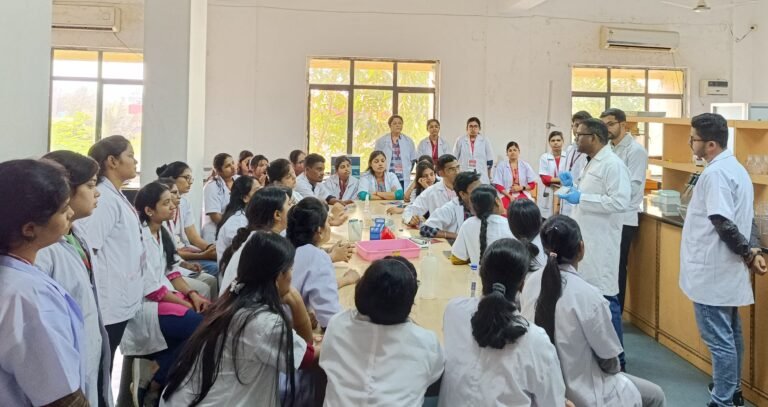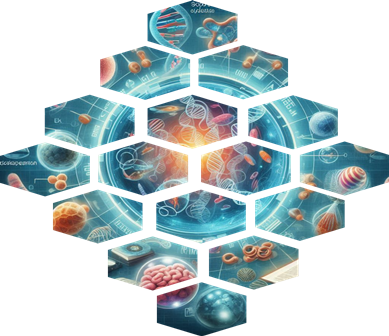Introduction:
The Master of Science (Zoology) curriculum is meticulously crafted to equip students with a comprehensive understanding of the structural organization, behavioral patterns, physiological processes, classification systems, evolutionary history, and ecological interactions of animals. Adhering to global academic standards, this program ensures that graduates possess profound expertise across the diverse spectrum of the animal kingdom, from the microscopic to the vertebrates. The curriculum encompasses a broad range of biological topics, including animal anatomy and physiology, ethology taxonomy and classification, ecology, evolution, Animal Biotechnology, Economic Zoology, Animal Development, Biochemistry, Molecular Biology, as well as both vertebrate and invertebrate zoology. This program is meticulously structured to cultivate a scientific mindset in students, preparing them to contribute significantly to the community. Additionally, it fosters an attitude that values interdisciplinary research and entrepreneurial skills, recognizing the importance of these attributes in today’s academic and professional landscape. Throughout the academic journey, students are strongly encouraged to engage in internships at various academic institutions and within the industrial sector, providing them with valuable hands-on experience and networking opportunities.
Syllabus Details:
The MSc Zoology curriculum is structured across four semesters over two years. The MSc Zoology curriculum is meticulously designed to provide a comprehensive understanding of both theoretical and practical aspects of the field. The program spans four semesters, blending core and elective courses to offer a well-rounded education. With a strict focus on science and research, the MSc Zoology syllabus is structured to equip students with the knowledge and skills necessary for future endeavors. The detailed semester-wise breakdown of courses provided below offers a clear overview of the program’s structure.
Semester-I:Cell Biology& Genetics, Molecular Biology,Biochemistry,Invertebrate Zoology,Animal Physiology,Laboratory course-I,Laboratory course-II
Semester-II: Microbiology &Immunology,Ecology & Biodiversity,Chordate Zoology,Endocrinology,Biostatistics,Laboratory course-III,Laboratory course-IV
Semester-III: Evolution and Population Genetics, Animal Development,Elective-1, Elective-II, Laboratory course-V, Laboratory course-VI, Research proposal & seminar
Semester-IV: Animal Biotechnology, Economic Zoology, Dissertation Work / Thesis and Presentation
Objective and learning outcome of the semester-wise syllabus.
Semester-I
Cell Biology& Genetics: To develop knowledge about the structure, function, and hereditary system of life. The student will have an understanding of the cell organization of life, cell organelles, cell division, and its regulation.
Molecular Biology: To understand the molecular aspect of the genetic inheritance in biological systems. A student will gain knowledge what is the genetic material that we inherit from our ancestors and how the coded information is replicated, transcribed, and expressed without any error.
Biochemistry: To get knowledge about biomolecules and their metabolism. The Student will know the structure and importance of different biomolecules, their metabolism, and enzyme activity.
Invertebrate Zoology: To develop the fundamental knowledge about the general and distinguishing characteristics of different non-chordate and invertebrate phyla along with the study of their life processes and the different systems evolved in their complexity. The students will know invertebrate systematics and its significance in their developmental process.
Animal Physiology: To know about the various organs, their structure, and working systems within the animal body. After completion of the course, students will know the different organs and its function in animals.
Semester-II
Microbiology &Immunology: To get knowledge about microorganisms and the immunological system. After completion of the course, a student will gain knowledge about microorganisms, innate and adaptive immunity, antigens & antibodies, and related techniques.
Ecology & Biodiversity: To understand the relationship between organisms, environment, and biodiversity. On completion of the course, a student will know about the ecological concept, population and community, resource, and sustainable development.
Chordate Zoology: To impart knowledge about the diversity, organization, and systematics of chordates. The paper will give exposure to the students about the different forms of chordate animals, their affinities, and about their systematics.
Endocrinology: To get knowledge about the endocrinological aspects of animals. After completion of the course, a student will gain knowledge about hormones, their signaling, and their mechanism of action.
Biostatistics: To learn about different methodologies of biological data analysis. On completion of the course, a student will know how to collect, describe, and use data to make inferences and conclusions about the real world.
Semester-III
Evolution and Population Genetics: To impart knowledge about the theories and concepts of Evolution and population. The students will be able to explain the striking similarities among vastly different forms of life, the changes that occur within populations, and the development of new life forms.
Animal Development: To understand the fundamental concept of the developmental process in animals. The course is expected to expose the students to the basics of developmental studies in the animal kingdom.
Research proposal & seminar: The research proposal is a validation for conducting the study and it provides a template to be followed when it is to be executed. For this paper, the goal is to write a scientific research proposal following the provided guidelines and make an oral seminar presentation. The research proposal will be subsequently implemented in the fourth semester. The students will be mentored by the faculty and will work very closely under their guidance. To learn the various components of conducting scientific research with a special focus on literature review and methodology and gain skills in putting together a research proposal on a specific topic of interest in the field of Microbiology/Life Sciences/Botany/Zoology.
Semester-IV
Animal Biotechnology: Objective: To learn about different techniques used to engineered and manipulate animals. Students will gain knowledge about improving animals and animal products.
Economic Zoology: To impart knowledge about the diverse aspects of Zoology linked with economic importance. It will provide a comprehensive idea about the economic ventures and aspects of zoological studies. It will help students to groom themselves as an entrepreneur.
Dissertation Work / Thesis and Presentation: To impart basic training to students to take up research work. The students are expected to complete the dissertation work and submit the thesis within the tenure of the semester. After the completion of the dissertation, a student is expected to gain knowledge about writing a dissertation including a review of literature, hypothesis, objective, data analysis, etc.
Eligibility:
BSc in Zoology, Botany, or Life Sciences from any recognized university with at least 50% marks in aggregate. Admission is based on career marks and performance in the AIPH University entrance examination/personal interview.
Potential carrier path:
Zoology offers a diverse range of career paths spanning academic, research, government, and corporate sectors. From exploring animal biodiversity and conducting scientific research to teaching, managing wildlife, and ensuring public health, zoology graduates can find opportunities in academia, research institutions, government agencies, zoos, and various industries. Potential roles include research scientists, epidemiologists, embryologists, editors, aquaculture specialists, animal rehabilitators, nutritionists, and field researchers, among many others.
About the AIPH University:
AIPH University is a prominent educational institution located in Bhubaneswar, Odisha, India. AIPH University is recognized for its commitment to public health and is the first of its kind in Odisha, with a history of community, hospital, and laboratory-based research and training in public health.
The School of Biological Sciences at AIPH University offers a diverse range of programs catering to the evolving needs of biological research and education. With a curriculum designed to foster expertise in various branches of biology, the school provides undergraduate and postgraduate courses, including B.Sc. in Microbiology, Biochemistry, Botany, and Zoology, as well as Master’s programs in these fields and Environmental Sciences. For those interested in advanced research, the school also offers Ph.D. programs in Biological Science. The university emphasizes a blend of theoretical knowledge and practical experience, preparing students for professional careers in biological research, environmental consulting, medical research, and more. For further information, prospective students can visit the university’s website (https://aiph.ac.in) or contact the admissions office directly.






